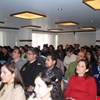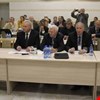


The International Land Coalition (ILC), Global Water Partnership (GWP) and International Water Management Institute (IWMI) has brought together land and water professionals, researchers and policy makers to reflect on the linkages between water and land in the emerging geopolitics of food, and to discuss cases from global, regional, basin, national or local levels, where these linkages were successfully addressed in legal frameworks, policy, and/or practice. The workshop is being held in Pretoria from 15 – 16 June 2015.

Eighty representatives from a diversity of water–related sectors participated in an informative meeting, held on 22 May 2015 in La Paz, to learn about the advantages of establishing a Country Water Partnership (CWP) in Bolivia.

The Global Water Partnership (GWP) has published its Annual Report for 2014, highlighting the Network’s achievements across all its thirteen (13) Regional Water Partnerships (RWPs) which includes the Global Water Partnership-Caribbean (GWP-C).

GWP eastern Africa partnered with the Nile Basin Initiative (NBI) to honor winners of the Nile Media Awards 2015 competition at a ceremony held on June 4, 2015 at Saint Gaspar Hotel in Dodoma, Tanzania.


The International WaterCentre (IWC) is currently offering several full scholarships for high calibre international candidates interested in studying the Master of Integrated Water Management (MIWM) commencing in Semester 1, 2016 at The University of Queensland.

GWP has presented its contribution to the Global Framework for Climate Services (GFCS) at the 17th World Meteorological Congress in Geneva.

The International Conference "Water conservation and water use efficiency", organized by the Network of Water Organizations from Eastern Europe, Caucasus and Central Asia (INBO-EECCA) took place on May 21, 2015 in Minsk.

The World Water Congress kicked off in Scotland yesterday (May 25th, 2015). Since 1973, the International Water Resources Association (IWRA) has held a World Water Congress every three (3) years in various locations around the world.